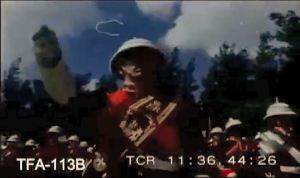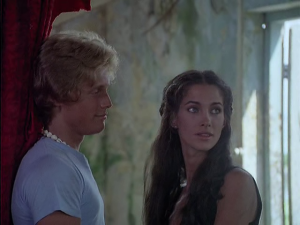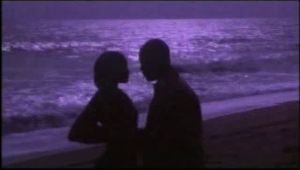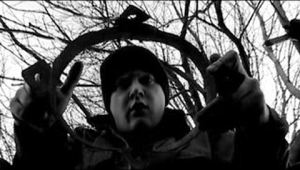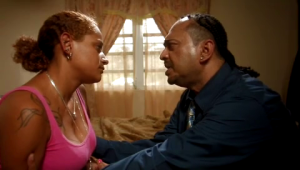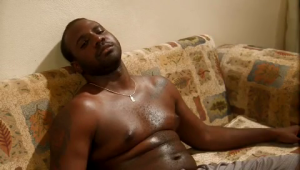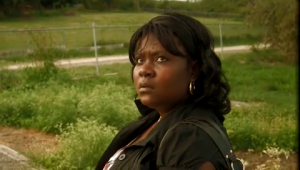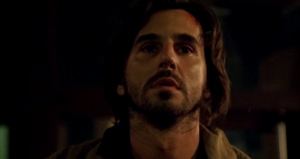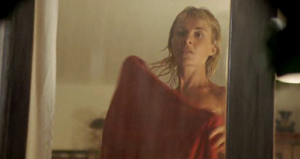You Can Never Go Home
On World On Film this time around, greed and hubris combine to throw acid in the face of love over in the Cayman Islands as its inhabitants are forced to question its reputation as a
Haven
(2004) Written & Directed by Frank E. Flowers
“Fucking paradise is about money like everything else!”
(You can see a trailer at the end of the previous post)
Last time, the blog paid a visit to Cape Verde, an uncomplicated former Portuguese dependency once so poor that most of its population left for (literally) greener pastures. Today, things have stabilized, and its people live seemingly uncomplicated lives, the low population ensuring no fights over resources and the still-developing society untroubled by the many problems associated with ‘modern’ life.
Things couldn’t be more difficult on the other side of the Atlantic, it seems. Not, at least, in the Cayman Islands, very much a current British dependency only a couple of hours’ flight from the U.S. It would hardly be an act of cynicism to attribute these factors as the Caymans’ contrastingly more complex character.
Of course, the Cayman Islands are famed not only for being a popular tropical getaway, but as an especially popular tax haven for off-shore banking. Changes to tax laws in places like the U.S and UK have more recently made this particular form of money laundering less profitable, with the local banks falling like dominoes as a result. Nonetheless, the damage to Paradise has been done, the Western world have destroyed the local society by raising it to a level of modernity that benefits only those who colonized it and who now leave the resulting cultural mish-mash to its own, poorer ends. If there is violence and instability in the once-happy Cayman Islands, it is because of the White Man’s Greed, his every act of hubris sending irreversible shockwaves through the delicate framework of the native community.
Or, at least, this is how writer/director Frank E. Flowers sees the Cayman plight. Whether or not his melodrama could, in fact, be transposed to any Caribbean Island is something perhaps better argued by those who know the region better than myself. Nonetheless, this is the story and the setting Haven gives us in its modern retelling of the old saying about money being the root of all evil, with a good amount of Bertrand Russell anti-imperialist discourse thrown in.

The film explores the far-reaching impact of greed when it unravels lives. Unfortunately, the execution doesn’t quite pull all the various strands together.
It’s not even out of place for once to be reviewing a Hollywood film in this blog. Though done for entirely practical reasons (the Caymans have no film industry), the fact that this is a story told through the lens of one of the Islands’ Western colonizers is entirely in tune with the story’s message.
“Haven gives us in its modern retelling of the old saying about money being the root of all evil, with a good amount of Bertrand Russell anti-imperialist discourse thrown in.”
Told as a nonlinear narrative, Haven is the story of a group of individuals who are both the instigators and victims of a series of chaotic events initially spanning a period of 24 hours, but which ultimately have far-reaching consequences when we then pick up the tale four months later. Dodgy Miami businessman Carl Ridley (Bill Paxton) flees federal investigators to the Caymans where his former accountant, the coldly-titled Mr. Allen (Stephen Dillane), is desperately seeking new sources of income now that all his old clients have dried up. Meanwhile, Ridley’s reluctant daughter Pippa (Agnes Bruckner), upset at the sudden forced relocation, runs into local ne’er-do-well Fritz (Victor Rasuk), who owes money to Richie Rich (Rasaaq Adoti), the self-appointed local crime boss. Unfortunately, Fritz happens to spy Ridley Senior’s stash of banknotes – physical currency being the only way to hide his remaining assets from the authorities – and suggests to Rich that he rob the newcomer to pay his debts. A final major plot strand involves a star-crossed romance between young local fisherman Shy (Orlando Bloom) and wealthy school senior Andrea (Zoe Saldana), whose family is violently opposed to their union. Throughout the film, the different stories weave together into an almost Shakespearean tragedy until its players are forever scarred by their interactions with one another.
I have discussed previously about the challenge involved in pulling off a non-linear narrative well, especially when it involves telling a story from multiple viewpoints and characters. Haven is a good attempt at the craft, but not a great one, leaving viewers to wonder at times who the story is really about. I know I’m not alone here, as the IMDB entry for the film can’t even make up its mind (compare the submitted premise at the top to the plot summary elsewhere). Haven’s tagline suggests the romance to be the major arc (‘Can love survive the fall of paradise?’), which is not surprising, given that it is by far the most compelling. Yet this is clearly not intended to be the case, with so much of the film given to the machinations of Ridley, Allen, and others. Haven is meant as an anthology spearheaded by a single event – the destruction of the island community’s innocence by the selfish actions of unscrupulous Westerners. This however, is more obvious to me in retrospect. At the time, the whole was not greater than the sum of its slightly disjointed parts.
Another reason the romance storyline probably stands out the most is because it is very difficult to care about most of the characters. Ridley has caused his own misery, Allen is largely amoral, and the best excuse the gangsters of the film can offer is “I gotta get a piece, man. By the hook or by the crook.”
Ironically, this line is delivered to the most unsympathetic character of all. In wannabe gangster Hammer, the story underscores another reason why sympathy in the viewer is difficult to come by. As presented, it does not give us sufficient time to develop emotional ties with many of the characters, thus making it difficult to care enough about their plights. Frank E. Flowers attempts to circumvent this for the Romeo & Juliet segments by giving Andrea a brother insecure to the point of violent psychosis, and Shy an antagonist who doesn’t like him, not because of any class discrimination, but simply because he exists. Thus their story benefits from a villain sufficiently ‘evil’ to bring their tale to a dramatic climax, but by a very two-dimensional means.
Hammer, like many of the island natives, make it very difficult for us to feel sorry that Western imperialism has destroyed their original culture. Perhaps the closest the Russell argument comes to being successful is through Fritz, whose ancestry in the Caymans stretches back centuries yet in the halfway house of cultures that the Caymans have become, he is like a directionless pack-rat, grabbing at the material wealth he sees around him without really knowing what to do with it, much less understanding the laws that govern the world which created it. This is a highly-valid discourse one will see re-enacted by the natives of many a colonised environment – the Australian aborigines being one such example. A shame then, that Fritz’s story is simply window-dressing in amongst the many other plot strands jostling for attention.
“Throughout the film, the different stories weave together into an almost Shakespearean tragedy until its players are forever scarred by their interactions with one another.”
Mr. Allen is another good case in point. A greedy, opportunistic money launderer who brought his family to the Caymans to live a life of luxury in paradise, Allen is now a hollow shell of his former self, too consumed by greed to care for a son fighting to establish his sexual identity or his hopelessly neglected wife. This is practically a story in itself, but given only a few snippets of time to tell his story, Allen is little more than a cardboard rogue spouting cynical disillusionment as to the truth of the Cayman dream. Sorry, don’t care.

The lost and neglected souls are caught in the chaos, powerless even just to get on with their lives.
Lack of depth is ultimately the problem throughout, with Haven trying to pretend it’s there through multiple plot strands that affect a large number of people. There’s a lot going on, in other words, but zoom in on any of it, and you find only cyphers projecting unremarkable plot elements handled better elsewhere.
At the same time, Haven boasts a fine cast who do the best with what they are given. The stand-outs for me are Orlando Bloom as the downtrodden Shy, Zoe Saldana as the damaged Andrea, and Stephen Dillane as Allen. Allen may be two-dimensional, but Dillane excellently portrays his naked greed and world-weariness atop a sea of frustration at the decline of his fortunes. Saldana and Bloom work well together as the initially innocent young lovers who want nothing more nor less than to be together, forced to then grow up rapidly into a damaged adulthood by the interference of others. (There were times when I felt the tagline ought to have been ‘Can love survive the interference of total jerks?’)
Haven is also shot entirely on location – the main reason I chose it – and so benefits from the entirely authentic Cayman scenery. It’s not remotely difficult to understand why the West fell in love with the place, though very tellingly, Flowers keeps the really beautiful scenery to a minimum, so as to emphasize the great distance between the inhabitants and the paradise they supposedly came to enjoy. As director, he keeps the narrative well-paced, with an editing that indicates the rapid turning of events yet doesn’t ever feel like a lot of cynical jump cuts to appease the attention-deficit knuckleheads in the audience. Lighting is used to good effect – night time scenes make frequent use of yellows and reds to keep everything emotionally-charged. And, for the most part, Flowers does a good job of showing ‘resets’ in the drama, ie – when we loop back to an earlier event but from the perspective of another character – something I only failed to catch once.
As writer however, Flowers needed to give Haven another draft to get the balance between the various story strands right to make the overall aims of the narrative clearer, and perhaps even more importantly, add dimension to his cardboard characters. Or at least to put the same amount of effort he put into Shy and Andrea into everyone else. It was clearly a story he very much wanted to tell, but perhaps wearing multiple hats as writer and director muddied the waters come execution time.
Even now, I find myself still making up my mind about the whole thing, but on balance, Haven is not as clever as it thinks it is, nor as deep as it would like to be. Yet it shows there is a compelling story to be told in the modern-day Caymans, and offers a reasonable glimpse of how it might unfold.
*****
Coming Up
A hundred years ago, they were slave labourers to their French overlords and, following the country’s independence in 1960, abused repeatedly by home-grown dictators fighting each other for control of their fate. Today, life is little better for the people of the Central African Republic, and that’s where we’ll be going next time on World On Film.
No Answers Only Questions
This week, World On Film returns to Bulgaria for the somewhat overambitious commentary on the human condition in Eastern Plays. Ironically, I found myself enjoying the film more when writing the review than when actually watching it.
Eastern Plays
(2009) Written & Directed by Kamen Kalev
You can find a trailer at the bottom of the previous entry.
“Many people start [are starting] to wake up and realize that their soul is sick.”

Growing pains: Bulgaria's rapidly-changing society has left its people lost, confused, and terrified.
The long, twilight struggle of existence in a violent, directionless world is the premise of Eastern Plays, a Bulgarian film that comments as much about that country’s society as it does about society in general. The story is told from the perspective of two brothers, Christo and Georgi, one in his thirties and recovering from drug addiction, the other young and impressionable, yet both staring into the abyss with only impenetrable darkness staring back. By turns, they fight and fall into meltdown as the chaotic world around them offers little meaning to guide them toward happiness and purpose. The premise of Kalev’s tale is certainly sound, however in practice, I found the delivery fairly disjointed and listless. It is peppered with touching and thought-provoking studies of human frailty, but ultimately does not really pull together as an entertaining whole.
One of the principal difficulties I had with Eastern Plays is its lethargic beginning, and a fairly rudderless one at that. A raft of characters is introduced; all pursuing their own paths to destruction, but there is no real clue as to either whom the story will principally focus upon, or what that story really is. Possibilities include a young man’s descent into gang violence, nationalism and politically-supported anti-immigration riots, family breakdown, and the generation gap. Then there is Christo, an unpleasant, self-loathing, chain-smoking artist, staring oblivion in the eye and desperate to pull himself away from it yet lost as to how. Ultimately, it becomes clear that Eastern Plays is his story, and as he battles his inner demons, the many layers of his character come to the fore and a more sensitive, highly-pensive character is revealed.
One could certainly argue that there is no reason why a film couldn’t contain all the above elements with multiple character arcs lightly intertwined with each other and the sum of the parts being a comment on some aspect of the human condition. In this, I couldn’t help but be reminded of the Bolivian film, Sexual Dependency, reviewed here a couple of weeks ago. However, whereas Sexual Dependency triumphs because all the parts slot into place within the greater commentary, Eastern Plays, attempting to do the same, fails because the result is hazy and the various sequences somehow more drawn out and dull in the process.
In hindsight, it seems far clearer that Kalev’s approach to the first half of the film was to fill the canvas with the wider problems of society so that the viewer will see Christo’s pain as a microcosm of that shared by the nation as a whole. Seemingly germane, there is however pain as a microcosm of that shared by the nation as a whole. Unfortunately, there is perhaps too much of this, thereby causing narrative incoherence: is the film about him or is it about Bulgaria? It is in the second half, when Christo’s story becomes the dominant narrative that things begin to pick up. Love interests and family become soundboards for attempts to make sense of everything, and these prove to be the more interesting sections of the film. It is the character interactions themselves rather than merely the occasional philosophical debate that shows humanity finding understanding and balance that are especially touching, although those brief philosophical debates do sum up the themes quite nicely.
“[Eastern Plays looks at] the long, twilight struggle of existence in a violent, directionless world.”
There is much to recommend on the acting front. Ovanes Torosian as gang member-wannabe Georgi does a very good job of portraying the confused adolescent whose inner turmoil is more evident in his eyes and quietude than his dialogue. Highly memorable also is the lovely Saadet Aksoy, a young and intelligent woman able to bridge the gaps between worlds despite fear and who is able to put voice to the social discord. The scenes between her and Christov are among the most engaging of all in Eastern Plays, save for some other touching moments where Christo puts voice to his fear and aspirations, and a scene near the end where he encounters an old man filled with the tranquility of understanding that Christo so desperately yearns for. The late Christo Christov is eminently believable as his namesake: bored of social expectation, longing for something more, and frustrated when it fails to materialize. He is pitiless to those unable to help him in his quest, and eminently warm and human to those seemingly able to provide it. It’s a great shame that Eastern Plays is both Christov’s debut and finale to the acting world, and an even greater shame that the film’s narrative disarray somewhat undermines his performance.
The character of Bulgaria itself, as depicted, is cold, lifeless and bleak. It is violently insecure as it struggles to define its own national identity, its citizens borne of both the Soviet nation it once was and the unsure republic it is today. The elderly cling to the orderly past, the young embrace the chaotic present, yet neither are happy. A line from Georgi, however, implies that the changes are for the better, implying that the Bulgaria of today is perhaps simply experiencing the birth pains of a new nation, though a generation will be lost to the uncertainty of transition as a result.
All of which brings us full circle: there are plenty of great and interesting themes explored in Eastern Plays, with the actors more than able to realise them within their believable and fragile characters. The lack of a tighter, more focused narrative, which dulls the pacing and fogs up the intent of the piece, is the biggest culprit. That Kalev is passionate about the subjects presented is very much in evidence, as is the fact that when it comes down to really exploring them through his characters, he is quite skilled at doing so. Here though, he tries to say too much at once, enshrouding the result in fog as a result. When he masters clarity and restraint, however, there is much to suggest his work will be something memorable indeed.
*****
.
.
Up Next
The conflict between generation and culture continues in Burkina Faso as one woman dares to say no to the common practice of genital mutilation. The colourful and thought-provoking window into West African traditions in Moolaadé, when World On Film returns. Click below to view a trailer:
To One In Paradise
This week, a good example of what happens in World On Film when a country of the week isn’t really known for its film industry and I have to find something to talk about. Travel in dubious fashion with me to Bermuda, where we discover why 1966 is the best time to visit, before spending 90 minutes hunting giant turtles while being bewitched by mysterious women.
First though, just a reminder that you can search through this blog’s past history to see what else has been covered through a variety of widgets all to be found at the bottom of the page.
Now, it’s time to away the anchor and set a course:
Destination Bermuda
(1966) The Bermuda Trade Development Board
Safe harbour in Mid-Atlantic, this speck of Mother Earth rimmed round by the great sea, Bermuda: 600 miles from anyplace else.
As the name suggests, Destination Bermuda is a travel documentary produced by the Bermuda Trade Development Board back in the days when the island colony was still Devonshire tea British. While it’s a little unusual for this blog given the nature of the piece, it certainly unveils the Caribbean outpost in all its glory. And yet, it is also the glory of a bygone age, the Bermuda of yesteryear – the unintentional sepia of another world, where it’s almost impossible to imagine it as a serious contemporary invitation to inbound tourism.
Never far from the ocean, the land is carved and shaped to the purposes of the golfer, who seeks the therapy of a club, a ball and 18 holes.
Perhaps unsurprisingly, Destination Bermuda presents the colony as an island resort, wherein the citizens are chiefly concerned with suntans, cycling and golf scores. The fish are so abundant that all one need do is drop an unbaited hook beneath the waves and within minutes, snapper the size of dinner plates helpfully impale themselves upon them in the hope they’ll see their own bodies caramelizing in a frying pan with their last dying convulsions. Men group together upon the rooftops of their shining white houses tossing back the house red after a solid day’s tiling, while the band of the Bermuda regiment regularly parade up and down Saint George in the interests of being vacuously British. Anyone with skin darker than a communion wafer is little more than a colourful addition to the periphery – a reminder that London is many leagues and latitudes distant.
“[The film depicts] the glory of a bygone age, the Bermuda of yesteryear – the unintentional sepia of another world.”
While the fashions and architecture of the day are obvious signs of dating, for me, it was the post-production of Destination Bermuda that really ages it. The rather paternal narration, a sequence of overdramatic lines attempting to be poetic, is delivered in that very measured and deep 60s tone. Ironically, an American artiste provides the voiceover, although as he says himself, Bermuda is a mere “90 minutes from New York”. Likewise the overblown musical score, in true 60s fashion, still clings to the silent film convention of a constant soundtrack, aggressively punctuating the departure of cruise ships with a full orchestra as though they were on their way to Pearl Harbour. The other half of the time, it’s a relentless barrage of harmonica ditties reminding anyone somehow unable to interpret the long band of blue on screen that Bermuda is a sea-based habitat. When one sequence literally broke into Tommy Reilly’s theme from The Navy Lark, I knew I’d been beaten. I half-expected to see one Chief Petty Officer Pertwee wandering up and down Hamilton high street trying to flog off contraband watches. Subtlety, it seems, has never been appreciated in the tourism industry.
This is not to say I didn’t enjoy Destination Bermuda. Its lively, slightly bombastic promotion of the country was all the more entertaining precisely because of its dated production values. It fails in its raison d’etre with a modern audience, but gains new meaning as a period piece. And while the Bermuda of 2010 is obviously a far different place with the dimming of Empire and the change in attitudes and technology, the landscape remains intact, as would the relaxed ‘island culture’ of the place. I left the film having little desire to visit it as it was, but curious to see what it has become.
The airlines don’t promise it and your travel agent can’t swear to it, but somehow, your pilot always manages to show you these islands before you land, for Bermuda perhaps, is a special destination.
Well, you would say that, wouldn’t you?
Travel Film Archive has made the program available to watch via YouTube, so check it out here:
*****
Tourism is all very well, but for me, there was one very iconic Bermuda-themed film from my childhood, involving star-crossed lovers, oceanographers, and giant turtles. Whether it really fits within the blog’s remit is debatable, but it could only be:
The Bermuda Depths
(1978) Written by William Overgard & Arthur Rankin Jr. Directed by Tsugunobo Katani
A young man returns to Bermuda hoping to discover why his father died 13 years earlier and becomes entranced by a mysterious young woman who turns out to be the childhood friend who disappeared into the sea that same day. Somehow, she is connected to his father’s strange fate, but the answers lie out there, in the Devil’s Triangle.
I first saw The Bermuda Depths many years ago and while the plot had faded from memory long since, there was something about it – an atmosphere, perhaps – that remained with me. A recent reviewing went some way toward explaining this, although it also suggested that my tastes were probably less demanding back then. What I see now is a film that has not aged well, unraveled in its designs by bad acting, dreadful special effects and a premise that proves effective only while under the influence of valium. The nonsense of the Bermuda Triangle too was perhaps more alluring in 1978, but seems painfully artificial now, perhaps because the coast guards of the region have been trying to get it through to people that nowhere near as many ships disappear in the area as pop culture would maintain, and those that have did so with a far more mundane explanation than some want to believe.
Others may suggest I’m missing the point of course, and The Bermuda Depths rides high on the wave of piffle the previous decades have built up surrounding this supposedly supernatural island chain. Throw in an emotionally-damaged young man, a family tragedy, an attractive siren in a black swimsuit and legends of archelonian leviathans, and herein is the tale intended to ensnare us from the distractions of logic. Well-done, these elements should come together to form an intriguing mystery and a haunting story of star-crossed love, but the delivery is off both before and behind the camera.
The central character of Magnus Dens, for example, is potentially the most intriguing. Dens, we learn, is an aimless drifter, orphaned by the tragic loss of his parents and directionless as a result. Upon returning to Bermuda, he finds himself entranced by a woman invisible to everyone but the local ‘wise woman’ who places her existence within the framework of a centuries-old curse. Rejecting the madness of the one person who believes him, Dens is treated with pitied sympathy by his friends, certain his crumbling psychological state is torturing him with the hallucinations of an imaginary friend. This, to me, demonstrates wonderful scope on the part of the lead that should lend true anguish and drama to the conflict. Unfortunately, actor Leigh McClosky brings this complex character to life with all the energy of a deflating balloon, his languid stares and lethargic movement interrupted at times by over-the-top aggression meant to signal an unleashing of his inner turmoil, but coming across as two-dimensional overexcitement. While I have no problem with the supporting cast, their efforts cannot make up for McClosky’s inability to act. Even the lovely Connie Sellecca’s superior performance as the almost spectral seductress Jennie – a subtle miasma of innocence and eternal regret – can only do so much when this is whom she must play against, although it’s likely no coincidence that it is with her that McClosky gives his best performances, Sellecca seemingly bringing out in him capabilities elsewhere hidden from view.
“[The Bermuda Depths] is a film that has not aged well, unraveled in its designs by bad acting, dreadful special effects and a premise that proves effective only while under the influence of valium.”
That said, William Overgard’s script clearly isn’t interested in being the character study it ought to in favour of a shallow pastiche of ‘Moby Dick’ vying for time with the elements of unrequited love. There’s no reason we can’t have both, but efforts to champion one direction come at the cost of another, perhaps in a desire to provide spectacle. This unfortunately is where the film’s low budget really becomes evident, with some very cheap and unconvincing model shots, special effects and atrocious day-for-night shooting , which admittedly I don’t recall being such glaring problems 20 years ago. The Bermuda Depths is one of those films that holds together far better not simply in the distant past when it was made, but in that hazy distance of memory, which over time smooths out the inconsistencies. It’s a little like being reunited with your first love and finding that much of what you recall about it has been rose-tinted in the years since.
The soundtrack too is an odd mish-mash of styles reflecting the shifting, unevenness of the plot. A haunting period theme song suggests temptation and seduction, giving way to a recurring (and indeed familiar) classical guitar motif, both of which must coexist with a strange retro thriller score that reminded me at times of orchestrations Malcolm Lockyer was creating in 60s sci-fi matinees. The final element of what one today might call ‘muzak’ fills out the dramatic downtime. The overall lack of coherence suggests the differing perspectives behind the scenes and a loss of clarity.
One thing that has not suffered from the passage of time, however, is the location itself. All exterior scenes were shot in Bermuda and its sleepy urban landscape, powder-white beaches flanked by picturesque rocky outcrops and azure sea go a long way toward compensating for other deficiencies. The local government, credited for assisting in the making of the film, would doubtless have seen it as an enticing travel promotion and deservedly so – it certainly worked on me. The natural landscape lends itself perfectly to the storyline and ultimately, it is only the artificial enhancements of post-production, weak plotting and character development that don’t stand up to scrutiny – especially to a modern audience.
Ultimately, these are the dangers of revisiting the past and the way it is often defeated by the ravages of time and the changes we undergo as a result. Ironically, this mirrors The Bermuda Depths rather well. The film itself is the beckoning siren, luring the rose-tinted memories of an ageing audience toward potential heartbreak, and like the ancient mariners, I failed to lash myself to the mast in time.
*****
Coming Up Next
Bhutan is another nation not known for its film industry, but it does produce film directors. One of them fairly recently produced Milarepa, famous Tibetan poet and yogi of the 11th and 12th Centuries, whose early life was fraught with poverty, misery and anger until he learned to rise above it. While the man himself was entirely real, the legends surrounding him slide into the realm of fantasy and magical melodrama, and it is to this realm that we will be exploring next time.
To view a trailer, click below:
Back On The Bottom Line
This week, romance in Benin as World On Film explores the straight-to-video Nollywood ‘classic’, Abeni, which until now, I had happily forgotten all about. We also discover the signature work of amateur English film-makers Wild Herb, who, despite being very visibly strapped for cash, manage to achieve what the BBC seemed utterly incapable of last December: a literary adaptation that actually used the book as its reference point.
Before we dive in, I’d just like to quickly mention that I have learned slightly more about WordPress in the last week and have added a search function to the blog – well, several actually, until I can figure out which are more useful. Scroll to the bottom of the main page to see how you can more easily access past entries, and I hope those widgets make life easier.
And now, brace yourselves for the entirely unnecessary existence of:
Abeni
(2006) Written by Yinka Ogun & François Okioh; Directed by Tunde Kelani

Abeni and Akanni are childhood sweethearts, happy until a fight separates them for seemingly forever, which is about how long this film feels like.
“You want to destroy my plans? I’ll deal with you mercilessly!”
Abeni and Akanni, two childhood sweethearts in Nigeria, are separated forever when an embarrassing incident at Abeni’s 10th birthday party convinces her boyfriend’s father to relocate the family to Benin and a new life. A chance meeting brings the two together many years later and they waste little time in picking up where they left off. The possibility of marriage however is threatened by Abeni’s father, who hasn’t forgotten the sins of the past and vows to stop the union at all costs.
Abeni was a film I decided to watch purely because I hadn’t seen Beninois cinema. Technically, I still haven’t, for although it is a Benin-Nigeria co-production, Abeni is more accurately a product of the unstoppable Nollywood juggernaut. Nonetheless, much of the story is set and filmed in Benin, which gave me some insight into a country of which I know little. Due to the nature of the storyline, one even gains an idea of the incredible disparity of wealth in both locations, and, if the film reports correctly, a certain cultural prejudice between the two states.
And yet by analysing these background themes, I feel myself elevating Abeni’s discourse far higher than it deserves, for beneath the colourful splendour of these West African nations lies an incredibly average romance tale of the type that Nollywood, Bollywood, and indeed those masters of formulaic rubbish in Hollywood churn out on a regular basis like supermarket-brand crackers because they know this tired and worn-out dime-store mediocrity sells. The foreign viewer may find themselves distracted by the different cultural presentation of the formula, but dross does not lose its pallor simply for wearing a different-shaped hat. A continual desire to get up and make cups of tea throughout the duration despite a lack of thirst may also indicate how little my body was willing to cooperate with the screening.
“A continual desire to get up and make cups of tea throughout the duration despite a lack of thirst may indicate how little my body was willing to cooperate with the screening.”
Certainly, the cultural landscape in which the conflict operated went some way towards making the story interesting, dealing as it does with a massive generation gap wherein arranged marriage is acceptable to the elders, while their Westernised descendants struggle for personal choice. Intermingled with this are the designs of wealthy families more concerned with empire-building than individual happiness. Handled in a considered, intelligent way, these themes would make for a good story and one that doubtless rings true with anyone who has ever had to face disapproving potential in-laws. However, Abeni is clearly another pre-packaged entry on the production line in which if one takes even a single step backward to view the larger picture, they will find many similar such offerings.
Conflict arising from the plot elements mentioned is never built up with any real seriousness that would give it meaning and the ending doesn’t even bother to follow through with the resolution that is employed. I found myself wondering as the credits rolled if perhaps my copy of the film had a scene missing. Alas, it merely seems to be an example of cheap melodrama on the part of a director who presumably can’t be bothered anymore. Add to this a bizarrely-inappropriate soundtrack, which in its levity, sends the exact same message – that and the fact that it seems to be more about shoehorning in the popular chart entry of the moment. Indeed, upon closer inspection, one finds the name Abdel Hakim Amzat in the credits not only as star beau Akanni, but also as head honcho of the music department and as a producer. The priorities of this vanity project are abundantly clear.
It may come as no surprise then that much of the characterisation is stereotypical in form and annoyingly realised on screen as a result. While the two leads are probably best-served and peroxide shiny for the youth market, the script divests the antagonists of all but two dimensions – not that the others can boast a multitude of depth, either. Kareem Odepoju plays Abeni’s father with a disregard for subtlety that reminds me of why pantomime is so awful, while Ayo Badmus as Ogogu, the paternally-approved rival for Abeni’s affections, clearly felt the best way to depict his character’s reckless behavior was to enact mental instability. Ogogu, we learn, was sent by his wealthy parents to the U.S, presumably so he could study how to be a cretin – an interesting snapshot into Nigerian perceptions of American culture that would be amusing if Ogogu weren’t so expertly irritating.
Quite a shame therefore that Abeni fails to be an interesting snapshot into any of the leitmotifs presented, though the Nollywood fan might perhaps argue that this would be like expecting to find the qualities of Perrier in grey water. It is ultimately little more than a hackneyed star vehicle for its leads – the filmic equivalent of a Happy Meal – no different to that one sees in Western cinema with monotonous regularity, but with that audience, the chimera of ‘ethnic’ unconventionality.
*****
The Crown
(2008) Based on ‘A Warning To The Curious’ by M.R. James Adapted & Directed by Jim Elliot
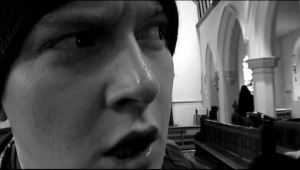
A would-be archaeologist hunting for an ancient crown in East Anglia finds more than he bargained for in this adaptation of the M.R. James classic tale.
Wild Herb Films are a small amateur group of film-makers operating out of England who, thanks to the powers of the internet, have been able to make their productions available to the world. As has been readily apparent in recent posts, my Christmas involves the watching of ghost stories, preferably those based on the works of the old masters. The Crown is based upon M.R. James’s celebrate tale, ‘A Warning To The Curious’, which was dramatized by the BBC back in 1972. One of my major criticisms of Aunty’s recent adaptation of Whistle And I’ll Come To You was that the producers, locked in the self-referential world of the television industry, could only see the merit in using the Jonathan Miller screenplay as their source material. This sort of short-sighted arrogance is precisely what we don’t need when it comes to bringing the classics to screens either small or big. So it was very pleasing to see that The Crown, for all its modifications to the text, had clearly used the original printed word as its inspiration, not some previous director’s work.
The plot centres around a young, amateur archaeologist by the name of Paxton in search of the last surviving crown of East Anglia, which is said to protect the land against invasion. Paxton is victorious in his quest, but discovers that the crown is protected by forces not of this world that have no intention of letting him succeed.
“ The Crown, for all its modifications to the text, had clearly used the original printed word as its inspiration, not some previous director’s work.”
To be sure, there are a number of departures from the short story, such as setting it in the modern day, and the climax is wholly different. However, much of this seems purely down to budgetary constraint than the irritating belief that one can ‘improve’ upon classic literature – or that the audience actually wants them to – and so as something of a purist, I can cut them some slack. It would, for example, require a massive wardrobe and props budget to recreate the 1920s. I do think that the climax could have been faithfully recreated without too much expenditure, but again, one gets the impression that for whatever reason, it wasn’t a viable option. Although the lack of funding is glaringly obvious during indoor scenes, the external shoots where Paxton is searching for the crown and encounters its guardian fare far better, with one pursuit scene very faithful to the original. The film, coming in at around 45 minutes, is largely a two-hander, the acting not being especially stellar, although fortunately, the best performance comes from the cast member playing Paxton, whom we see the most. While Lawrence Gordon-Clarke, director of the BBC effort, hasn’t too much to worry about, Euros Lyn and Neil Cross, instigators of the new Whistle, could learn a thing or two about literary fidelity.
You can watch or the download the production for yourself here, where it is available in 3 parts.
*****
Up Next
World On Film encountered homophobia in the Bahamas, locals dancing through the streets in sailor suits in Barbados, and now Bermuda beckons. To say however that Bermuda has a thriving film industry would be a complete and utter lie, and therefore a certain amount of creativity had to be employed to make possible my efforts to include the country. For now, let’s just say it involves tourism and turtles and you can find out next time precisely how I once again had to stretch my own criteria to breaking point. Until then.
Standing On Higher Ground
World On Film visits not one, but two countries this week, owing principally to the fact that I could only get short films for each locale and although this normally means a review accompanied by the usual side topic, there’s been more than enough deviation lately (your host is deviant enough as it is). Until the next episode, anyway. The combination turned out to be an interesting one in any case, with one entry proving that major topics can be too broad in scope for a short film, and the other entry proving the exact opposite. Read on to find out just what I mean as we travel first to the Bahamas for the romance drama Float, followed by a short sojourn in Bahrain for the black comedy, The Last Bahraini.
Float
(2007) Directed by Kareem Mortimer

Jonathan Murray and Stephen Tyrone Williams play two men who find love and truth in Kareem Mortimer's ambitious short film, 'Float'.
(To view a trailer, look to the bottom of last week’s post.)
Float tells the story of Jonny, a nervous young artist trapped in a world where his homosexuality is condemned and his talents and timidity are unappreciated by his father. Only his art teacher seems to recognise the aptitude trapped inside and she sends him to Eleuthera to find himself. There, Jonny finds his identity through the help of Romeo, a young man confident of all but his sexuality, and discovers that he may have more courage than he realises.
Coming in at just under 35 minutes, Float does not have a good deal of time to explore its chosen themes and in consequence, the human voyage of discovery and transition seem to happen just a little too quickly and easily to ring true. That aside however, the characterisation is handled with understanding and warmth. The awkward, introverted and timid Jonny, as played believably by Jonathan Murray is someone you ultimately want to see triumph when that first spark of defiance becomes evident. Similarly, the carefree and affable Romeo, as played by Stephen Tyrone Williams, elicits appropriate feelings of betrayal when he is unable to live up to the very philosophy he seemingly preaches. They may not be Oscar-winning performances, but there is an honesty and a resonance to them.
“Coming in at just under 35 minutes, Float does not have a good deal of time to explore its chosen themes.”
While a culture of homosexual persecution is the film’s main theme, it is only really in the opening sequences where this is made manifest, through footage of anti-gay rights protesters. Although punctuated slightly further by a couple of scenes with some street kids, the real persecution, it is emphasised, is that which we inflict upon ourselves through fear. While these external and internal battles are worthwhile and form a strong basis for a tale of the struggle for personal freedom fought every day by many across the world, they are very tall pillars for such a short film to support – at least in the way the script was conceived. I’m fairly sure that many who are dealing with these very issues would argue that they are not overcome quite so easily. Doubtless budget was a constraining factor here, though it should have led writer/director Kareem Mortimer to consider what is achievable within the constraints imposed – yes, you can tell the story in half an hour, but will it have the same impact?
Nonetheless, while this leaves Float feeling at times like the edited highlights of much longer story, it is still an entertaining gallop through a moving and very personal struggle. Mortimer could certainly not be accused of slow pacing – indeed, we are missing none of the story’s crucial elements and each is constructed with the skill of a genuine film-maker. The dialogue is feels real enough and generates real emotion. This being the Bahamas, Mortimer is also blessed with a natural set that paints its own rich colours and only adds wonderfully to the human battle for freedom. You are almost left wondering how some people have time for such pointless persecution in the face of so much natural beauty – the human tragedy in a nutshell.
Thus, while Float suffers from a lack of depth and development borne of obvious budget limitations, the parts still hold together well enough to deliver its underlying message intact and in an engaging way.
The Last Bahraini
(2007) Written & Directed by Farid Alkhajah
Getting hold of a Bahraini film proved especially difficult, as at present, one is unlikely to see the few that have been made outside of film festivals, although that of course depends upon when you’re reading this. Happily, Burning Dream Films stepped into the breach with the humourous and telling short commentary on racial hubris and attitudes to immigration, entitled The Last Bahraini. BDF is actually no more nor less than writer/director and indeed crewman 1-200, Farid Alkhajah, but although his film betrays its amateur roots, it says far more in 6 ½ minutes than a certain Tropical Films (Antigua) struggles to do in 40 minutes.
The film is a two-hander, depicting the chance encounter of a rather nationalistic Bahraini citizen of dubious morals and an Indian taxi driver who manages to annoy him from the moment the two meet. One needn’t be especially aware of Bahraini social attitudes to enjoy the film, but simply live in a country with an immigration policy to see the same sheet music played out by the same kinds of bigots we know so well.
“One needn’t be especially aware of Bahraini social attitudes to enjoy the film.”
However, Alkhajah injects his commentary with a great degree of ironic humour, which ultimately makes The Last Bahraini as good as it is. It may be nothing new to laugh off the absurdity of empty prejudice, but it’s always the best solution, although doubtless, those quickest to propagate their prejudice are also the first to miss the point.
Shot on location mostly at night, Alkhajah’s camerawork is obviously not Scorsese, but sufficient to capture the story in an effective manner. The film’s two stars, Hamad Albinali and Amir Hussein meanwhile, get the dialogue off the page convincingly and spark off each other well. Scenes where Albinali roams the streets look a bit unconvincing and self-conscious, but that’s more of a directorial issue than one of acting. Also, the subtitles are a little too fast and convoluted during scenes rich in dialogue and I had to pause and rewind a couple of times to catch everything. Overall however, the parts pull together sufficiently well enough and deliver as a whole, and I’ll be keeping an eye on Alkhajah in the future – a promising talent likely to go from strength to strength.
Burning Dream Films has a youtube presence, so you can watch The Last Bahraini for yourself right here:
*****
Next Time
A young Muslim boy struggles to make sense of the strange, contradictory world around him as East Pakistan battles for independence. A nation’s loss of innocence when World On Film returns to examine the moving Bangladeshi full-length drama, The Clay Bird. To view a trailer, click here.
Grand Canyon
I normally start a post by relating some of the other things I’ve watched during the week. On this occasion, however, it’s quite a long story, dealing as it does with my attending the closing night of the Chungmuro International Film Festival in Seoul. I’ve therefore placed that section below and instead will jump straight into this week’s entry. Representing Armenia therefore is the Armenia-Canada-Germany co-production:
Calendar
(1993) Written and Directed by Atom Egoyan
Calendar is a slightly unusual film offering, written, filmed, directed, performed and possibly even fixed together with Scotch tape by Atom Egoyan, with this being my first trip into his cinematic world. It is a film that builds subtly, almost voyeuristically, so that the viewer finds themselves delving into the lives of its subjects to a level of prolonged discomfort, which reaches its crescendo as their true nature unfolds, all the while within some wonderful Armenian landscapes.
“It is a film that builds subtly, almost voyeuristically, so that the viewer finds themselves delving into the lives of its subjects to a level of prolonged discomfort”
The plot concerns a Canadian-Armenian photographer returned to the land of his ancestors with the job of photographing his homeland’s most picturesque churches for a forthcoming calendar. He is accompanied by his Armenian wife, acting as translator for the local driver and guide they have hired to provide them with background information on all the sites visited. The unassuming beginning suggests that this is more or less the sum-total of the film, but with every new location, we slowly learn of the deeply fragmented relationship present between the married couple and the cause of the ensuing distance between them. The way in which the film is shot helps to underscore this gulf, with the photographer never seen with his wife in the same place at the same time. Indeed, we only see him some time after the calendar has been printed, while we only see her during the photoshoot, very tellingly only in the company of the driver.
In some ways, Calendar is rather difficult to watch, with the characters becoming more and more grotesque as the narrative progresses, especially that of the photographer, whose mounting jealousy (which could itself be described as a grotesque emotion) is exacerbated further by his unpleasant personality, particularly evident throughout scenes occurring in the present where, still emotionally in orbit around his estranged wife, he ‘auditions’ a long line of potential replacements (something that is not explicitly stated, so other viewers may have a different interpretation). Yet the film is shot in a very simple and effective way, which captures the claustrophobic mood of the piece while highlighting the wonderful natural backdrop. The camera is locked off in every scene, perhaps to mimic the still photography of the calendar itself, forcing the viewer to pay close attention to the tense and unspoken decay of the relationship. The still frame, accompanied by the subjects frequently in mid to long shot, further symbolize the distance felt by the man behind the camera and only serve to heighten his sense of isolation. These sequences are intercut with handicam footage of the characters’ journey through Armenia, and yet despite providing the opportunity for motion, it is no more comforting, with the bluish tint and frequent lack of sound simply another form of isolation.
Egoyan is clearly a skilled photographer, and he lovingly captures the churches with the warmth and texture you would expect to see on a professional calendar. This only serves to heighten the contrasting coldness and unease created by the characters themselves, which Egoyan as the photographer and Arsinee Khanjian as the wife expertly create. It’s certainly not a pleasant cinematic adventure, but anyone who has experienced that phase of a relationship will at least know the horrible awkwardness created between two people who were once close, and the helpless feeling of loss as a result. Unfortunately, drawn as he is, it is well-nigh impossible to sympathize with the protagonist’s predicament, though his wife is by no means a victim.
“[The wonderful back drop] only serves to heighten the contrasting coldness and unease created by the characters themselves “
The deeply personal discomfort, while real, does perhaps ensure Calendar is probably not something I could sit through too often, but the effective minimalist approach on the production side and the jarring juxtaposition of cold, reserved knife-edge drama against the ultimately inconsequential polychromatic background has imbued a strong sense of the Atom Egoyan style. Certainly not a crowd-pleaser, but a director guaranteed to provoke thought. I’m certainly curious enough to explore some of his back catalogue some day.
Sugar Bullets
Last Friday evening, I managed to catch the tail end of the Chungmuro International Film Festival in Seoul. The largest such event in Korea is hands down the Pusan International Film Festival, but CHIFFS is undoubtedly the second-largest, having run this year from September 2-11. Chungmuro was the seat of the local film industry as far back as the early 1960s, and although the major studios have since expanded and relocated to the now wealthier southern district of Gangnam (herein one finds the headquarters of the nation’s conglomerates and the city’s major convention centres), it still symbolizes all things cinema to many. Running since 2007, CHIFFS has been an attempt to keep its legacy alive by screening the festival’s large selection of features at venues in and around the area.
Rain-soaked skies bookended the finale, but the crowd assembled were of a respectable size. Cameramen were falling over themselves to document the arrival of the many self-important political entities, but otherwise, the atmosphere was fairly relaxed. The aged venue was a far cry from the modern, cookie-cutter multiplex behemoths, with absolutely no neon lighting or overpriced snack bar (although having skipped dinner to reach Seoul, this would have been a welcome sight). A high stage that could easily double for the other definition of theatre held the large screen on which we would see the final hurrah for CHIFFS 2010. I had travelled a long way to see this film and was eager to see it begin.
“Cameramen were falling over themselves to document the arrival of the many self-important political entities, but otherwise, the atmosphere was fairly relaxed.”
When the dithering crowd made little effort to actually sit down, a helpful announcer reminded them that everyone was keen to get the evening’s entertainment underway. This seemed to prompt people into action, and they at last managed to settle into their high-backed cushioned wooden seats – volunteers would excitedly relocate anyone who had unhelpfully chosen the side aisles to the centre, so as to help maintain the illusion of a full house. At last, the lights dimmed and a video retrospective hurriedly skimmed through the highlights of the last week-and-a-half. The helpful alacrity was then halted, as the house once again lit up and a glittering woman took the stage –our host for the evening.
One of the criticisms of many Korean events that purport to be international is the lazy lack of proper bilingualism. Even as I write, the English version of the CHIFFS website (http://www.chiffs.kr/eng/main.asp) is still yet to be finished and contains only about 10% of the information found on the Korean site – much of that information crucial, such as a schedule of events and explanations as to precisely how one can buy tickets. This half-hearted approach was in evidence that final evening, as the host would very helpfully give a cursory translation of her far more animated Korean pronouncements, as though having to relate her words in another language was an unnecessary evil. She would then, in English, introduce one of the aforementioned dignitaries to the stage, who would then proceed to give what could have been a brief history of the Sydney Mardis Gras, for it was not translated. This continued through several speech-makers: introduction in English, speech in Korean. I dutifully clapped at the appropriate moment, beginning to wonder if the film had actually been subtitled as advertised.

'What's that, Sooty? You want to make a film about people passing out from the heat because you're cold?'
The film of course, was not in any danger of starting anytime soon. Next to appear on stage, director Tony Chan, who, in muted tones, explained the thinking behind his brand new epic, Hot Summer Days – a U.S-China-Hong Kong extravaganza. In the story, Hong Kong, thanks to global warming, is experiencing its hottest summer ever, with citizens regularly collapsing to the ground in exhaustion and ice-cream available only to the highest bidder. Anyone familiar with interviews conducted on local television with someone who only speaks English would have recognised the odd spectacle now before us: the host confidently asked her questions in Korean, an interpreter would quickly whisper a translation into Chan’s ear, he would then address the crowd in English, followed by the host providing a summary in Korean. It was difficult not to think of the Sooty Show during the exchange. “What’s that, Sooty? Why did I make a film about the hottest summer ever? Izzy wizzy, let’s get busy?”
Chan’s answer to this question, meanwhile, seemed to sum up the amount of intellectualising he had put into the script. “Well, uh, I wrote the film in the middle of Winter, and it was really cold. So I didn’t want to write a film about Winter and it just came to me. Of course, we didn’t actually have 100 days of Summer to shoot, and that was the most difficult part.” The warning bells were ringing, but it was too late. I was committed by this point no matter what happened. Nonetheless, I was still upbeat about the whole thing, and with the silliness of the interview over, I sat back in anticipation. Then the singers arrived.
“I was still upbeat about the whole thing, and with the silliness of the interview over, I sat back in anticipation. Then the singers arrived.”
Although I couldn’t see any obvious connection to the festival with Josh Groban’s motivational ‘You Raise Me Up’, the opera-capable male quartet who brought it to life certainly delivered a very capable rendition. It was upbeat, after all, and that at least was the intended spirit of the event. Which doesn’t explain the next two barbershop quartet showtunes, mercifully sang in Korean, thus obscuring their saccharine lyrics. Finally, the mystifying musical entertainment was over and an intermission was called – presumably to give people time to check that they’d come to the right place. A resigned 10 minutes passed and then, mercifully, Hot Summer Days finally rolled.
And it was one of the most awful, syrupy pieces of cinematic mush I’ve ever been forced to endure. A romance-comedy, it featured the courtship and mishaps of a series of couples across Hong Kong and the Chinese mainland. Romance comedies typically rely on a string of improbable coincidences to ensure both conflict and happy endings, but Tony Chan clearly felt that these alone were enough to construct a film – that and the presence of the usual HK film stars, such as Nicholas Tse and Jacky Cheung. I won’t even bother to relate the involvement of the talking goldfish. It was like the worst excesses of the genre, only super-concentrated, and I was not the only viewer present to writhe in my seat as, with every passing minute, Chan blew raspberries at improbability, laying down track after track of cliché and cornball nonsense until the credits rolled – 90 minutes after the debacle had begun. If you weren’t diabetic going in, you certainly were going out.
Several minutes later, one of my companions was heard to wonder in hushed tones how something like this had ever been selected for the closing ceremony. The indifferent rain continued to hurl itself at the ground as he puffed away thoughtfully on a cigarette. Nonetheless, we all agreed that it had been worth coming. Exploration is what film festivals are all about. Hopefully the next adventure will be a little more savoury. And without a barbershop quartet.
“It was one of the most awful, syrupy pieces of cinematic mush I’ve ever been forced to endure.”
*****
Next Time
Hell on earth: imprisoned in the wilds of 19th Century Tasmania, a group of repeat-offenders make a desperate bid for escape across one of the world’s most unforgiving landscapes – a realm where even the Aboriginal natives can’t survive. A true story from Australia’s dark convict past unfolds in the uncompromising 2009 epic, Van Diemen’s Land. The official trailer appears below:
In The Shadows
When the crew of a research submarine searching for new bio fuels in the Arctic Circle mysteriously disappears, another is sent to continue with the work. However, a black box recording compels the crew to discover what happened to the other vessel, especially when that same threat descends upon them – something large and silent that slices through the icy waters like a prehistoric leviathan.
The Deep, starring James Nesbitt and Minnie Driver is a miniseries rather than a film, and one that looked extremely good before I was silly enough to watch it, expecting something along the lines of The Abyss, which episode 1 very tantalisingly suggests. However, it soon strays into Hunt For Red October territory and which point my interest sank through to the mantle. There is also the running theme of scientific triumph overcoming common sense in the name of riches, but explored with the care and consideration of a Sci Fi Channel script, the quality of which, if you’re unfamiliar, is the equivalent of having Russell Brand perform comedy. The Deep should therefore be consigned to the self-same Arctic seabed the program explores and best forgotten.
Happily, this is easily done as this week’s entry in World On Film is the excellent Argentinean romance murder-mystery…
The Secret In Their Eyes
(2009) Directed by Juan Campanella
A trailer can be found at the bottom of last week’s entry.
“A guy can change anything. His face, his home, his family, his girlfriend, his religion, his God. But there’s one thing he can’t change. He can’t change his passion.”
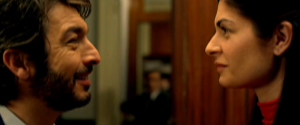
Ricardo Darin and Soledad Villamil play star-crossed lovers who find the ties that bind hold forever.
The Secret In Their Eyes builds upon the very essence of life: a sequence of key moments that can completely change our destinies if we recognise them for what they are, held together by the long ordinary days in between where we don’t feel remarkable enough to act. Yet its ultimate message is one of hope, while also challenging us to decide whether or not in certain situations revenge is justified. I am not normally a big fan of crime fiction, let alone romance, yet if The Secret In Their Eyes was indicative of the way in which crime-romance cinema normally entertains, I’d have to jump the tracks and nail my colours to the mast. However, The Secret In Their Eyes is simply a very good film, written and directed with confident maturity, populated with engaging characters expertly realized, and one that really makes you think long after the credits have rolled up into the screen.
“The Secret In Their Eyes is simply a very good film, one that really makes you think long after the credits have rolled up into the screen.”
As the 20th Century draws to a close, retired federal justice agent Benjamin Esposito decides to fictionalise an especially memorable case from his younger days – one that changed his life forever. However, as the memories come flooding back, the unsolved 1974 crime refuses to fade away, and Esposito finds himself compelled to solve it once and for all, in the process rediscovering his undying love for a woman he once let slip through his fingers. Along the way, he learns what truly makes humans tick and that true passion may be the strongest force in existence, although it may manifest itself in ways too hard to accept.
It will therefore hardly be surprising that I consider one of the film’s prime strengths to be its study of the human condition. On one level, the commentary is nothing new: love, longing, missed opportunities, regret, fallibility, weakness, malice; yet this is humanity in a nutshell, with every generation enacting the same drama as before.
Secret is not intended to turn this all-encompassing portrait on its side and offer a new interpretation. Its characters are straightforward, easily-identifiable and found all around us – they may even be us. The aim is to show them in all their glory and misery and break them down into the raw emotions that make us all tick. If you’ve never truly loved and lost, much of the film simply won’t resonate as anything more than a tired cliché. Likewise, if you don’t care for a study on the mechanics of human behaviour, this isn’t for you. It’s not a new paradigm of the genre, rather a very open and honest one that relies very much on the viewer’s own life experience for it to make impact. Others may be put off by the analysis of revenge, especially as it invites introspection on one’s own character by film’s end. Yet this is surely the point.
“If you’ve never truly loved and lost, much of the film simply won’t resonate as anything more than a tired cliché.”
Another of Secret’s key strengths is the choice of actors and the characters themselves. Ricardo Darin’s Esposito is at turns very subdued, worn down by the realities of life, yet elsewhere a fiery champion of justice – perhaps not unsurprising given his vocation, but Darin has the feel of the character just right. In opposition, Soledad Villamil’s Irene is a woman in conflict: career-driven, struggling to walk the right path, and torn by her feelings. If anyone embodied the film’s title, it would have to be Pablo Rago’s portrayal of Ricardo Morales, the husband of a rape victim. Rago’s wide eyes says so much, yet hide even more. Perhaps especially memorable however is Esposito’s friend, Pablo Sandoval, played by Guillermo Francella. It may again be unoriginal that the film’s comic relief turns out to have the greatest insight (and espouse the film’s central message), but the oft-ignored yet wise fool is a long-enduring character simply for what he offers the viewer. There is also something earthy and endearing about Francella’s performance that keeps your eyes trained upon him. The humour also provides a welcome release amidst the darker themes of the film.
This is helped further by the touching, at times hauntingly-beautiful score provided by Federico Jusid and Emilio Kauderer, proving an excellent match for the often sombre mood director Juan Campanella aims to create. Although ‘sepia’ would be too strong a word, there is a definite yellowish tint awash over the flashback sequences that give the film its art-house feel and atmosphere. Running at just over two hours, Campanella has managed to set the pace just right – anything slower would lose the audience, yet to speed things up would be to destroy the important character moments, often carried by lingering expressions that say more than dialogue ever would. Yet dialogue is very much the centrepiece of the film – none of the themes are left unexplored and Campanella isn’t interested in letting the visuals do all the talking. Again, I felt the balance between the visual discourse and the verbal was just right.
As my first entry into Argentinian film, I was very impressed with The Secret In Their Eyes. However, to dwell on its country of its origin would be to do it a disservice, for it is simply good cinema. While its commentary on its universal themes may not work for everyone, I think many will enjoy the very touching and human tale that unfolds. If it ultimately leaves you a little unsettled and undecided as to the choices taken within the narrative, it has achieved its goal.
.
.
*****
Up Next
A freelance photographer, sent to Armenia with his wife to snap the local churches for a forthcoming calendar, encounters the eternal triangle in Atom Egoyan’s 1993 film, Calendar. No trailer I’m afraid, although this youtube video does provide a kind of background teaser:
Nice ‘N Sleazy
Hello again. In the sultry, summer humid hideousness that is the first week of August (as opposed to the rest of it?), I managed to catch a film from 2009 I’m sure many have never heard of – Triangle, a thriller drawing inspiration from the Bermuda polygon of the same name, although only in a very distant sense. A group of friends go sailing one morning, only to find themselves caught up in a freak storm. Barely surviving their way through the high seas and deluge, the capsized crew suddenly finds an ocean liner in their path. But relief turns to bewilderment when the seemingly empty vessel proves more dangerous than any high seas-thunderstorm. And why does one of the survivors recognise the ship despite never having set foot on its decks? For answers, they must return to the end of the beginning. Triangle, starring former Australian soap star Melissa George, is one of those films that will appeal more to fans of mainstream film than genre aficionados. It explores a number of interesting concepts that many a horror or sci-fi have entertained before it, but despite its shortcomings, Triangle is intriguing and compelling enough for the viewer to want to see their way through to the end.
“Despite its shortcomings, Triangle is intriguing and compelling enough for the viewer to want to see their way through to the end.”
At any rate, last week, I posted the trailer to Amor Idiota, this week’s film up for review. If you missed the trailer, you’ll find it at the bottom of the previous post. The original intention was to descend upon the principality of Andorra, the small country between Eastern Spain and France. IMDB, the ever-helpful companion providing inspiration for every film I select on my global journey, assured me that Amor Idiota was a Spanish-Andorran co-production. However, the film is shot and set in Spain, so whatever connection it has with Andorra remains a mystery – financial, I presume. On the other hand, the Spanish province of Catalonia shares both the same cultural background and indeed language as its neighbour, so much so, that with the growing Catalonian cries for independence, I can’t help wondering if political maps of the not-too-distant future might see very different Western European borders. But enough of that. Let’s move on to the film itself.
Amor Idiota
(2004) Directed by Ventura Pons
“My life’s been one long, fruitful journey towards idiocy. As a teenager, I realised I was an idiot. Later, I discovered I wasn’t the only one. Now that I’m pushing 35, I see that not only is everyone an idiot, but that we’ll never stop being so.”
Pere-Lluc is a man unsatisfied by ordinary life. In his mid-thirties and drifting through an existence devoid of meaning, he passes his days a slave to his instincts, aware of the consequences reckless abandon brings, but entirely unmotivated by reason or common sense. A chance encounter with the striking and married director of an advertising firm one evening suddenly gives his life purpose, as he pursues her with a desperate licentiousness – aware of the consequences, but a slave to animal instinct. Inevitable misunderstandings ensue, but Pere-Lluc cannot fight his instincts – he must have the object of his desire, even if it means suffering pain and humiliation to get it.
With Amor Idiota, I find myself challenged to pin down the point writer Lluís-Anton Baulenas and director Ventura Pons were trying to make: ‘stalking – you’d pretty much have to’, perhaps? There are certainly strong indicators that the more well-trodden message of love, wandering, and sunsets will lift us through the chaotic waters of emptiness and self-loathing is the principal message. Unfortunately, the characters designed to illustrate this ideal are painted far too shallow to make any of their actions believable, let alone convince the viewer of the ending that results almost in spite of their actions. Their maladjusted behavior and fatalistic philosophies, which form much of the film’s dialogue, are ultimately squandered as a result. It’s interesting in turn how hard the script attempts to apologise for its lead character’s impulses, with Pere-Lluc being highly self-aware of his ‘idiocy’, as though the idea that someone unfulfilled by ordinary life is horribly wrong – clearly they must be social refuse.
“With Amor Idiota, I find myself challenged to pin down the point writer Lluís-Anton Baulenas and director Ventura Pons were trying to make: ‘stalking – you’d pretty much have to’, perhaps?”
‘Idiocy’ here is almost a misused euphemism – acting upon impulse alone suggests a lack of intelligence, yet in human terms this does not make the principal characters stupid, merely self-centred, driven to depression and frustration by the ticking clock and their inability to subscribe to society’s expectations of where they should now be in their thirties. I can easily sympathise with anyone who finds themselves in this position, yet because the dramatis personae in Amor Idiota are drawn in such unsympathetic and antisocial ways, this entire avenue of middle-aged social commentary is bulldozed to rubble within the first few minutes, the remaining debris atomised by the stunning cowardice or perhaps cornball mismatch (I can’t decide which) of the ending.
Yet the whole misadventure did not leave me bored, perhaps because its silliness kept me guessing. Somehow, I felt compelled to find out where Pons was going with all his maltreated philosophy, and would Pere-Lluc have evolved as a person now that stalking had given his life meaning? I wasn’t best pleased with the result. The film’s unpleasant characters and grotesque discourse compelled me despite myself, curious to see how it would all come to a head, but the finale made me feel an idiot for watching.
“The film’s unpleasant characters and grotesque discourse compelled me despite myself, curious to see how it would all come to a head, but the finale made me feel an idiot for watching.”
The unsurprising standouts of the cast itself are Santi Millan, whose portrayal of the bored, intellectual sleaze Pere-Lluc is right on the money, assuming that this was the intent. I probably saw a bit more of his genitals than I would have liked – that they are symbolic of Pere-Lluc’s surrender to his animal instincts is more desirably clear through the several thousand lines of dialogue stating this point. Cayetana Guillén Cuervo provides an interesting contrast, with the character of Sandra slowly revealing the many layers of her troubled personality to the point where she fits right in with the rest of the gang of misfits. With Pere-Lluc baring all that he is from the beginning, this peeling of the onion provides a welcome and necessary contrast given the ultimate similarity of the leads -seemingly doomed to self-destruction from the very outset.
While I’m not a devotee of the romance genre, I can’t help feeling that it’s so over-mined that the sub-oeuvre of ‘misfits in love’ itself is bound to have been explored to better gain elsewhere. Whether Ventura Pons will have been discovered to have been deeply misunderstood is something for future ages to ponder. For now though, Amor Idiota stands as a mish-mash of valid discourse executed badly, causing at least this reviewer to wonder if he’s either missed the point or been punished for thinking too deeply. Then again, the lead characters manage to achieve both without really coming to a satisfactory conclusion. That in the end, is how this Barcelona farce left me.
Next Time…
However, it isn’t the end of World On Film’s Catalan connection. Sometime later, I managed to find a short film actually shot and set this time in Andorra itself and that will be the subject of next week’s post when we discover the Biblically-inspired – and unfortunately trailer-less – sci-fi drama, Don’t Take The Name Of God In Vain.









